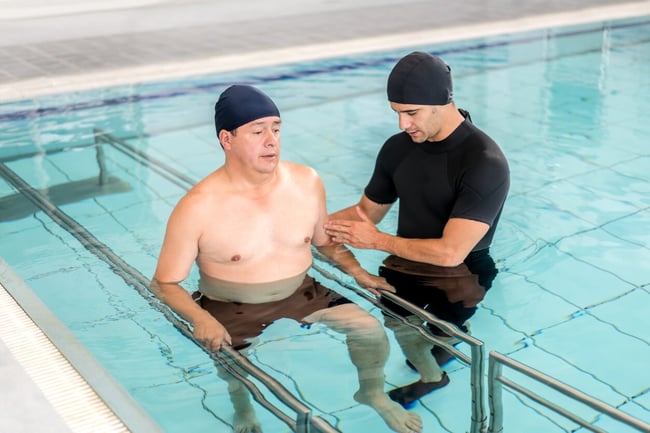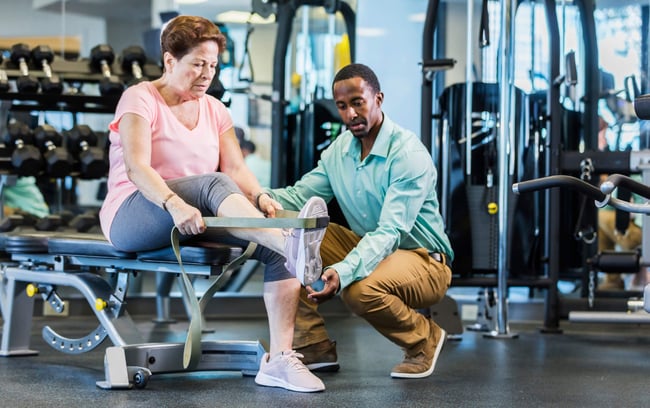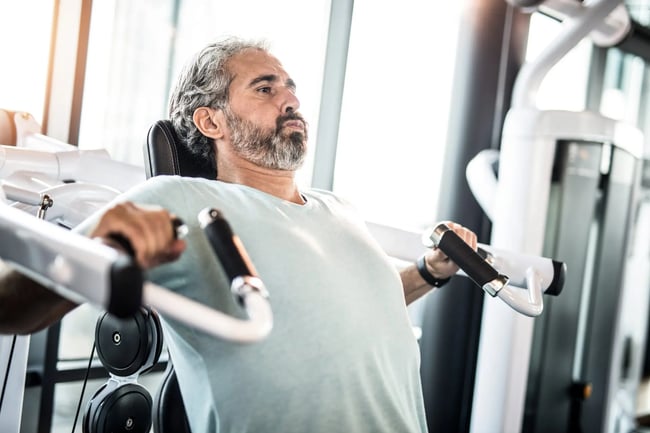
Work Conditioning Programs and Exercise Physiology Services
With specialist experience, industry knowledge and evidence-based therapy, our work conditioning programs help to achieve positive outcomes. We draw on the expertise of our qualified exercise physiologists and allied health practitioners within Altius Group’s 95 locations across Australia to support clients' physical and psychological recovery, helping them achieve a better quality of life.

Our Movement and Work Conditioning Services
Stretch, Strength and Movement Programs
Our Move Exercise Physiology programs help individuals who have suffered an injury and those wishing to prevent muscle deterioration and injuries. Our allied health professionals, located throughout Australia, can help individuals or groups of employees in workplace settings, emphasising mind and movement principles for overall wellbeing.
We work with doctors, insurers and case managers, and educate on the correct stretching and movement that leads to improved mobility and long-term muscle condition. Our award-winning exercise physiology services programs provide a holistic, client-centred care approach for individuals. An individual’s program may include assessing the participant’s health and lifestyle, understanding a participant’s current functional capacity, a review of their diet and physical activity, and the development of short, medium and long-term goals.
Workplace Stretch and Movement Programs (SAM) are either specific or tailored stretching and education programs that help employees take accountability for their safety and physical wellbeing. The needs of the workplace are included in the program and can include educating employees on manual handling, stretching techniques, how to reduce injury risk, and the importance of physical activity or movement exercise for long-term health.
Our exercise physiologists:
- Create a movement exercise programs that is tailored to the individual, their injuries and situation, or to a workplace and the needs of its employees.
- Educate on correct stretching and movement for the prevention of workplace injuries, reducing workers’ compensation claims and absenteeism and improving productivity.
- Collaborate with Altius Group’s team of allied health professionals across a range of backgrounds to provide holistic programs and support.
Exercise Physiology Treatment
Clinical exercise is a cornerstone in our exercise physiology services, focusing on managing chronic disease and treat major injuries. Our exercise physiologists provide individuals with education, advice on lifestyle changes and support to aid recovery. Treatment helps manage existing health conditions, prevent other conditions, reduce the risk of hospital readmission, and accelerate recovery. Our treatment is individualised so as recovery progresses, treatment is altered. Where required, our exercise physiologists will work with allied health colleagues to provide the best long-term outcome for our clients’ mind and movement wellness.
Our Move Exercise Physiology programs are also available, which concentrate on educating participants about:
- The benefits of consistent exercise.
- Good sleep hygiene.
- Improved mental health.
- Incidental exercise.
- Community and social engagement.
- Healthy mind, body and spirit.
Pre and Post Return to Work Support in the Workplace
Returning to work can be hard for employees recovering from an injury. We work with clients to focus on their work-related functional activity to make sure the way they move improves their recovery and return to work outcomes. An initial assessment by an exercise physiologist will help educate clients on the factors that will contribute to improved outcomes. Our movement for life approach extends to a comprehensive treatment plan, which may include our professionals working with clients in the gym, workplace and home.
Our occupational assessors can assist with employees transitioning back to work. By ensuring the tasks and environment are suitable for the recovering employee, we can have employees back to work faster with a reduced risk of a relapse or new injury. Our tailored workplace rehabilitation solutions achieve the best possible outcome for the returning employee and the organisation.
Our exercise physiologists:
- Have a strong bio-psychosocial focus and help clients implement effective solutions to any barriers preventing their return to work or their usual life.
- Tailor support to the specific needs of an individual and the nature of the work they are returning to.
- Empower individuals with education to improve their long-term health and wellbeing outcomes.
Hydrotherapy
Hydrotherapy involves exercising in a pool to treat a variety of conditions and reduce pain or stiffness. It can be used as a supplement to physical therapy as moving in water provides a low-resistance way to exercise safely. Our professional exercise physiologists assist clients one-on-one in hydrotherapy sessions to build stamina and muscle strength without the risk of further injury.
Hydrotherapy has many benefits:
- Hydrotherapy can be used in conjunction with other forms of therapy to reduce recovery time.
- After a major injury or disability, the sport or exercise a client once enjoyed may no longer be possible. They risk falling into a sedentary lifestyle which is harmful to their physical and mental health. By introducing clients to hydrotherapy, they’re experiencing exercise that they can continue long-term.
- It improves physical fitness without the risk of further injury.
Gym Programs
Gym work is an important part of the recovery and conditioning for some clients. Weight-bearing exercise offers a range of benefits. Bones become denser and stronger, and the joints are better protected. Our exercise physiologists ensure the right exercise is completed correctly to aid in building an individual’s strength and reducing the risk of another injury. As a client recovers and builds strength, the gym and conditioning program allows them to continue progressing safely until they achieve their goals.
Altius Group’s gym programs:
- Are delivered by exercise physiologists who are experienced at tailoring gym programs and other exercises to support improvements to mental health conditions. The Black Dog Institute found that 16 weeks of regular exercise can be equally effective as antidepressant medication in the treatment of mild to moderate depression.
- Are guided by exercise physiologists to ensure exercises minimise injury while working to increase functioning.
- Are designed to be enjoyable and achievable, to motivate individuals to participate fully in the program.
Restoration of Independence
Independence means different things to different people. It may be going back to work to earn an income, getting behind the wheel, or returning home. Our qualified occupational therapists can help individuals regain the mental and physical abilities they may have lost through injury or illness. An assessment of a client’s abilities checks the activities they can undertake and the activities they need assistance with.
An exercise physiologist can help many individuals regain their strength and ability with a variety of tasks. Being independent is often a mix of physical and mental strength. Many people will suffer from anxiety or depression following an injury or chronic illness. A psychologist can assist with overcoming mental health issues and rebuild their confidence.
Our allied health professionals:
- Collaborate with one another to provide the holistic expertise they need to regain their independence.
- Always listen and assess first, then recommend a tailored approach to achieving individual goals.
- Develop programs and strategies that fit with an individual’s lifestyle and deliver these through either face to face or telehealth sessions.
Physical and Work Conditioning
An injury or lengthy time away from work can result in deconditioning of the body. Within as little as five or six weeks, our bodies can lose 30-40% of their strength. For people who do manual work, they’re at increased risk of an injury or illness if they return to work at 100% of their previous capacity. Individuals returning to work often require physical, functional and behavioural solutions to improve their capacity and condition for carrying out their previous, or a new, role.
An exercise physiologist or occupational therapist can assist employees with effective return to work or conditioning strategies. These movement for life strategies allow individuals to build their body to safe level where they can fulfil their workload.
Our Physical and Work Conditioning programs:
- Take a short amount of time to educate a returning worker. However, they can save weeks, even months of not being at work while they recover from an injury.
- Promote a proactive approach to physical and work conditioning which can cost a fraction of just one worker’s compensation claim.
- Help employees feel appreciated, by their employer's time and effort to ensure their safety and wellbeing.
Chronic Disease Management
Chronic diseases are life-changing for most people. Every facet of life can be impacted including work, family life, social activities and hobbies. However, effective management of a chronic disease can reduce its impact. Exercise can be one of the most effective forms of non-medicated treatment.
Whether it’s heart disease, diabetes, asthma, back pain, arthritis, cancer, or dementia, we specialise in move exercise physiology, focusing on personalised exercise plans to manage the symptoms and improve quality of life
we can help manage the symptoms and improve quality of life. Our exercise physiologists understand the impact chronic diseases have on the body. By prescribing the right level and intensity of exercise, a client can gain strength, fitness and confidence.
Our exercise physiologists can benefit those with a chronic disease by:
- Developing tailored programs to reduce pain and joint stiffness and increase muscle strength and fitness to improve a person’s quality of life.
- Providing support to access other Altius Group allied health professionals to manage their chronic disease, such as psychologists. Our range of allied health professionals can help clients who might need more than just physical help. Depression and anxiety often follow a chronic illness diagnosis. Our psychologists can help clients manage the impact the disease has on their mental health.
- Collaborating with referring doctors and specialists to ensure their patient receives the best possible holistic care.
Manual Handling Education
Educating a client on the best practices of manual handling can save them from ever experiencing an injury or suffering a recurring injury. Few workers know the correct way to push, pull, lift or hold a load without proper education. Our allied health team consider the type of manual handling tasks an individual performs and their physical attributes to tailor the education to their requirements.
Our tailored training programs ensure workers are shown the correct way to complete manual tasks. After the program, employees are empowered to take responsibility for their own safety and physical wellbeing.
The education can include:
- Manual task risk factors.
- Assessing the risk of lifting, pulling, holding, or pushing an object.
- Risk factors surrounding injuries such as Carpal Tunnel Syndrome, and occupational overuse conditions.
- Stretching and strengthening to avoid injuries.









